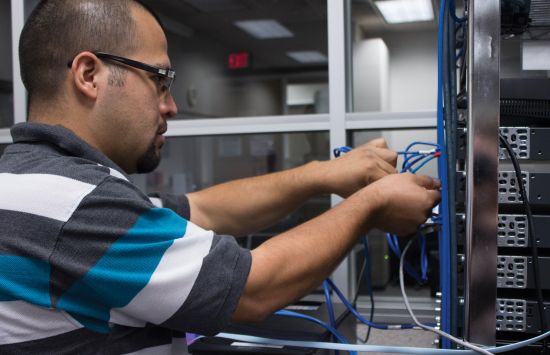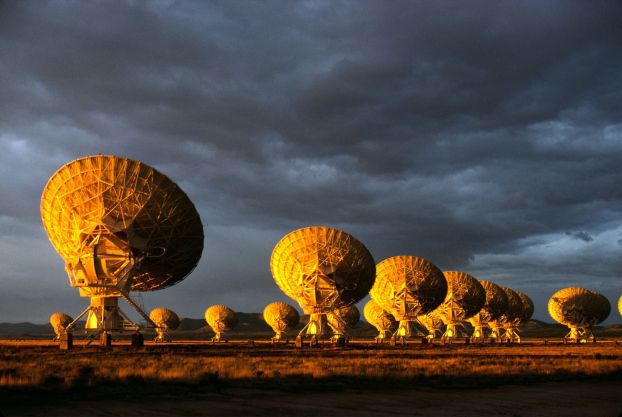The U.S. National Science Foundation has invested in foundational research on wireless technologies for decades, laying the groundwork for cellular, Wi-Fi and satellite networks and the Internet of Things.
Wireless communication networks are an essential service of modern society, connecting billions of people and supporting critical services, including education, transportation and public health.
As demand for faster, more affordable, and more secure wireless communication grows, NSF-supported research will offer new insights critical for future technologies — like distributed machine learning, mobile edge computing, and 6G (and beyond) cellular networks.
 On this page
On this page
Brought to you by NSF
NSF's decades of sustained investments have ensured the continual progress of advanced communications and wireless research. Pioneering work supported by NSF includes:
The internet
Drawing on the Defense Advanced Research Projects Agency's pioneering support for early computer networking projects and the development of internet protocols, NSF funds catalyzed the creation of the commercial internet.
Fiber optics
NSF-funded research was essential to the development of optical fibers that underpin today’s global communication systems, from high-speed internet to long-distance network connections.
Spectrum auctions
The federal government uses NSF-funded auction-theory research to sell broadcasting licenses to companies for use in areas like television and telecommunications.
What we support

Fundamental research
We support the fundamental research that enables the design and development of advanced wireless technologies.

Research testbeds
We support the creation of research testing platforms, in collaboration with industry, to experiment with new advanced wireless technologies.

Spectrum use
We promote dynamic and agile use of the electromagnetic spectrum, while fostering innovation and security for all users.

Education and workforce development
We support the creation of a diverse workforce ready to develop and operate the wireless and spectrum technologies of the future.

Partnerships to accelerate progress
We partner with other federal agencies, industry and nonprofits to share data, tools, expertise and other resources; strengthen workforce development; and translate research into products and services that benefit society.

Spectrum Innovation Initiative
The electromagnetic radio spectrum is finite and must be shared across wireless systems and applications, including mobile connectivity, air traffic control, weather prediction and research.
NSF’s Spectrum Innovation Initiative supports research that enables fast, accurate and dynamic coordination and usage of limited spectrum resources.
Featured funding
America's Seed Fund (SBIR/STTR)
Supports startups and small businesses to translate research into products and services, including wireless technologies, for the public good.
Campus Cyberinfrastructure
Supports coordinated campus-level networking and cyberinfrastructure improvements for science applications and distributed research projects.
Communications and Information Foundations
Supports research on the theoretical underpinnings of information acquisition, transmission and processing in communications and information processing systems.
Communications, Circuits and Sensing-Systems
Supports research on circuit and system hardware and signal processing techniques in the following areas: radio-frequency circuits and antennas for communications and sensing; communication systems and signal processing; and dynamic bio-sensing systems.
Experiential Learning for Emerging and Novel Technologies
Supports experiential learning opportunities that provide cohorts of diverse learners with the skills needed to succeed in advanced wireless and other emerging technology fields.
Ideas Lab: Breaking the Low Latency Barrier for Verticals in Next-G Wireless Networks
Supports participation in an intense, facilitated workshop to stimulate collaborative solutions to meet the requirements of specific low-latency verticals including rapid prototyping, testing, validation and at-scale pilot demonstrations.
Networking Technology and Systems
Supports research on large-scale, complex, heterogeneous communications networks, including research in wired and wireless technologies such as terabit Ethernet, optical, radio and acoustic visible light-based communication, and quantum.
Secure and Trustworthy Cyberspace
Supports research addressing cybersecurity and privacy, drawing on expertise in computing, communication and information sciences and other fields.
Smart and Connected Communities
Supports use-inspired research that addresses communities' social, economic and environmental challenges by integrating intelligent technologies with the natural and built environments.



